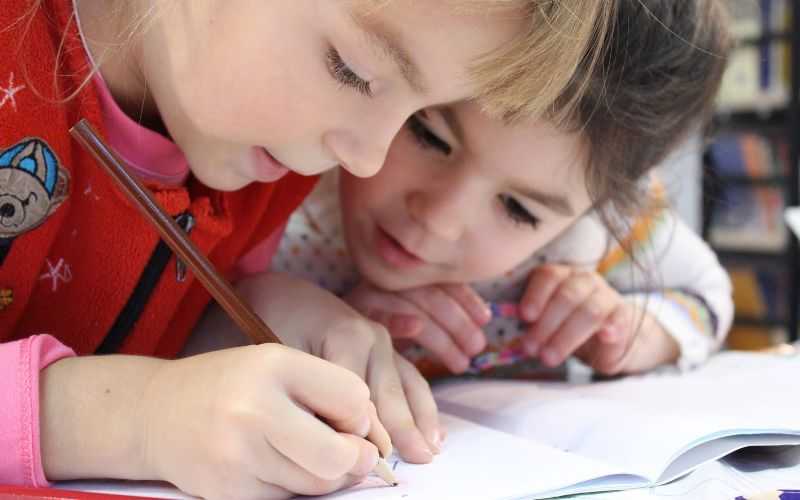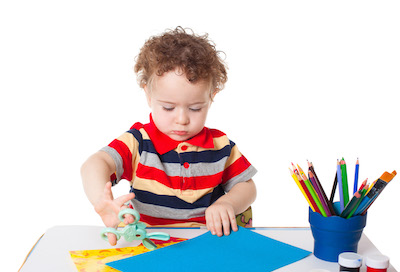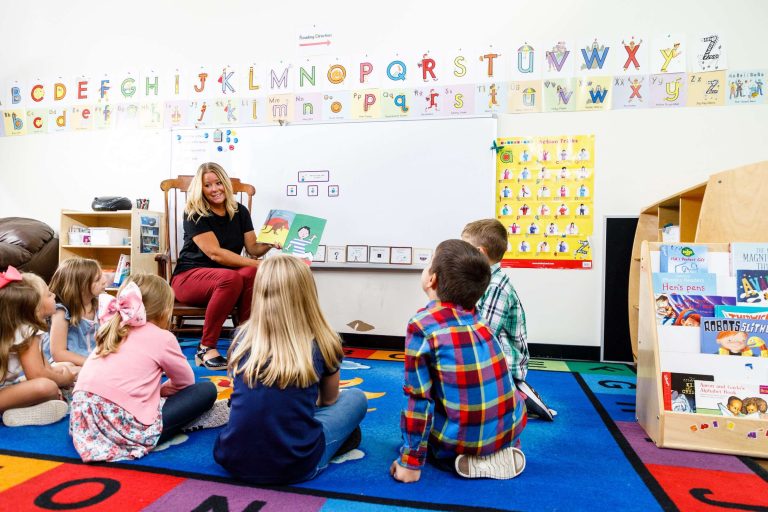How Can You Help Preschool Children Develop Pre-Writing Skills?

To help preschool children develop pre-writing skills, engage them in activities such as drawing, tracing, and using manipulatives to strengthen their hand muscles and hand-eye coordination. Encourage them to use various writing tools and paper to practice forming shapes, lines, and letters.
Additionally, provide opportunities for children to participate in activities that promote bilateral coordination, such as cutting with scissors and playing with clay, to enhance their fine motor skills. These experiences will support the development of essential skills needed for writing and prepare children for future academic success.
Introducing preschool children to pre-writing activities is essential in nurturing their fine motor skills and preparing them for successful academic endeavors. By engaging children in age-appropriate exercises and playful activities, educators and parents can set the stage for the development of crucial pre-writing skills. Through drawing, tracing, and using various writing tools, children can enhance their hand-eye coordination and hand muscles, enabling them to form shapes, lines, and eventually, letters. This article outlines effective strategies to support preschool children in developing pre-writing skills, emphasizing the importance of engaging in activities and diverse learning experiences.
Fostering Pre-writing Skills In Preschoolers
In preschool, children begin to develop the foundational skills needed for writing. Fostering these pre-writing skills is essential to set the stage for successful writing in the future. By understanding the importance of pre-writing skills and identifying the developmental milestones for preschoolers, parents, and educators can support and encourage the development of these crucial abilities. Let’s explore these aspects in more detail.
Understanding The Importance Of Pre-writing Skills
Pre-writing skills are the fundamental abilities that young children need to develop before they can start writing letters and words. These skills lay the groundwork for successful handwriting and language development. By focusing on pre-writing skills, children can develop the motor coordination, spatial awareness, and hand strength necessary to become proficient writers. It also plays a vital role in cognitive and literacy development, setting the stage for academic success.
Identifying The Developmental Milestones For Preschoolers
It’s important to recognize the developmental milestones that preschoolers should achieve to support their pre-writing skills. These milestones include grasping and manipulation of writing tools, hand-eye coordination, and the ability to make basic shapes and lines. As children progress through early childhood, their fine motor skills should improve, allowing them to make more precise movements. By staying aware of these milestones, parents and teachers can identify areas where children may need additional support and guidance in developing their pre-writing skills.
Engaging Activities For Skill Development
Engaging preschool children in fun and interactive activities is crucial for developing their pre-writing skills. By incorporating engaging activities, you can help them develop fine motor skills, dexterity, and writing readiness. Here are some engaging activities that can facilitate skill development in preschool children:
Incorporating Fun Fine Motor Skill Exercises
Engaging preschoolers in activities that focus on developing their fine motor skills can significantly contribute to their pre-writing skills. Some fun activities include:
- Using play dough to mold shapes, letters, and numbers, encouraging precise hand movements and control.
- Finger painting to explore different textures and develop hand-eye coordination.
- Using tweezers or tongs to pick up small objects, promotes hand dexterity and strengthening finger muscles.
Utilizing Crafts For Enhanced Dexterity
Craft activities can play a significant role in enhancing the dexterity and hand-eye coordination of preschool children. Engage them in activities such as:
- Cutting and pasting activities to improve hand-eye coordination and encourage precise hand movements.
- Stringing beads to enhance hand dexterity and promote control over small objects.
- Folding paper to create origami shapes, fostering finger strength and control.
Interactive Games That Promote Writing Readiness
Interactive games can be an effective way to promote writing readiness in preschool children. Consider incorporating games such as:
- Trace and write activities that involve tracing patterns, letters, and shapes to develop fine motor skills and hand coordination.
- Sensory bins filled with materials like sand or rice for children to write and draw in, enhancing tactile sensitivity and finger muscle control.
- Sight word scavenger hunts encourage active movement while recognizing and writing words, promoting overall writing readiness.
How Can You Help Preschool Children Develop Pre-writing Skills?
Developing pre-writing skills is crucial for preschool children as it sets the foundation for efficient writing in the future. By providing the right tools, a supportive environment, and encouraging regular practice through fun activities, you can help preschoolers enhance their pre-writing skills. Here are some effective methods to consider:
Offering A Variety Of Writing Tools And Surfaces
Offering preschoolers a variety of writing tools and surfaces can stimulate creativity, fine-tune motor skills, and enhance their hand-eye coordination. Different writing tools such as crayons, markers, pencils, and chalk allow children to experience varied tactile sensations, which are crucial for developing muscle strength and control required for writing. Diverse surfaces like paper, whiteboards, chalkboards, and sand tables provide opportunities for children to experiment and develop their writing motions.
Creating A Supportive And Pressure-free Writing Environment
A supportive and pressure-free writing environment is essential for preschool children. Encouraging them to explore creativity, make mistakes, and develop at their own pace is crucial. Provide positive feedback and celebrate their efforts to cultivate a positive attitude towards writing. Ensure that writing materials are accessible and ergonomically suitable for young children, making it easier for them to engage in writing activities at their comfort.
Encouraging Regular Practice Through Playful Methods
Encourage children to practice writing through playful methods such as drawing shapes, tracing patterns, and engaging in finger paints. By integrating fun elements into writing activities, children are more likely to engage and practice their pre-writing skills willingly. These activities help in developing hand strength, fine motor skills, and spatial awareness, all of which are essential for proficient writing in the future.
Hand Strength And Coordination
Developing hand strength and coordination is crucial for preschool children to acquire the foundational skills needed for writing. Strong and coordinated hands not only facilitate the ability to hold and control a pencil but also lay the groundwork for fine motor skills essential for academic success.
Exercises And Play Activities To Build Hand Muscles
Engaging preschoolers in activities that target hand muscles can promote the development of hand strength. Here are some exercises and play activities to stimulate the hand muscles:
- Using playdough or clay to roll, mold, and squeeze with their hands
- Stringing large beads or lacing cards
- Playing with small, manipulative toys like building blocks or pegboards
- Relay races involving activities such as carrying objects using tongs or tweezers
Tips For Improving Hand-eye Coordination
Hand-eye coordination is essential for executing precise movements and maintaining control. To enhance hand-eye coordination in preschoolers, consider the following tips:
- Engage in drawing and coloring activities to enhance visual-motor coordination
- Play games that involve catching, throwing, and kicking to improve eye-hand coordination
- Introduce simple puzzles and sorting activities to refine hand-eye coordination skills
- Encourage activities that involve using scissors to develop hand-eye coordination and fine motor skills
Importance Of Developing A Proper Pencil Grasp
Establishing a proper pencil grasp is fundamental for writing readiness. An appropriate pencil grasp lays the foundation for efficient writing skills. Here are the key elements of developing a proper pencil grasp:
- Encourage the use of age-appropriate writing instruments to facilitate the development of a functional pencil grasp
- Provide triangular or ergonomically designed pencils and crayons to support a proper grasp
- Guide children to hold the writing utensil using their fingers and thumb, forming a tripod grip
- Offer activities that promote finger strength and dexterity, such as tearing paper, using clothespins, or playing with small objects
Strategies For Reinforcing Learning
When it comes to helping preschool children develop pre-writing skills, reinforcing their learning through various strategies can have a significant impact on their progress. Utilizing praise and positive reinforcement techniques, setting achievable goals for motivation, and maintaining consistent routines are key methods for reinforcing learning and enhancing pre-writing skills in young children.
Praise And Positive Reinforcement Techniques
Praising and providing positive reinforcement for a child’s efforts can have a profound effect on their willingness to engage in pre-writing activities. Simple affirmations such as “You’re doing great!” and “I’m proud of your hard work” can boost a child’s confidence and motivation. Furthermore, using small rewards such as stickers or verbal praise can encourage them to continue practicing their pre-writing skills.
Setting Achievable Goals For Motivation
Establishing achievable goals for preschool children can serve as a powerful motivator for developing pre-writing skills. By breaking down the learning process into manageable steps and celebrating each achievement, children are more likely to stay engaged and feel a sense of accomplishment. For example, setting a goal for a child to accurately trace basic shapes before moving on to more complex forms can keep them motivated to progress.
Consistent Routines To Instill Good Writing Habits
Consistent routines play a crucial role in instilling good writing habits in preschool children. By incorporating regular pre-writing practice into their daily schedule, such as dedicating a specific time each day for activities like drawing, tracing, and coloring, children can develop a sense of discipline and expectation for their learning. Consistency helps reinforce the importance of pre-writing skills and establishes a foundation for future writing proficiency.

Frequently Asked Questions For How Can You Help Preschool Children Develop Pre-writing Skills?
How Can I Encourage My Preschooler To Practice Pre-writing Skills?
You can encourage your preschooler by providing various activities such as drawing, tracing shapes, and playing with playdough. These activities help develop hand-eye coordination and fine motor skills necessary for writing.
What Are Some Fun And Educational Activities To Develop Pre-writing Skills?
Engage your preschooler in activities like finger painting, using chalk, practicing letter formation with sand trays, and playing with building blocks. These activities help stimulate creativity and develop essential pre-writing skills.
Why Is Developing Pre-writing Skills Important For Preschool Children?
Developing pre-writing skills in preschoolers is crucial for laying the foundation for writing. It enhances their hand strength, finger dexterity, and coordination, which are essential for successful writing in the later stages of their education.
Conclusion
In nurturing pre-writing skills, consistency and patience are key. Engaging children in diverse activities like coloring, drawing, and tracing shapes can foster their fine motor abilities. Encouraging verbal expression and providing ample opportunity for practice enhances their development. By creating a supportive environment, you can help preschoolers build a strong foundation for their future writing endeavors.

Emily specializes in integrating arts into early childhood education. She believes in fostering creativity and imagination through music, art, and drama activities.






